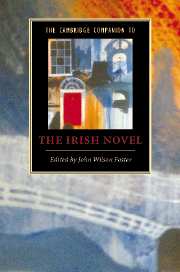Book contents
- Frontmatter
- Introduction
- 1 The novel before 1800
- 2 The national tale and allied genres, 1770s-1840s
- 3 The novel of the big house
- 4 The Gothic novel
- 5 Catholics and fiction during the Union, 1801-1922
- 6 Irish modernisms, 1880-1930
- 7 James Joyce
- 8 Region, realism and reaction, 1922-1972
- 9 The novel in Irish
- 10 Women novelists, 1930s-1960s
- 11 Two post-modern novelists: Samuel Beckett and Flann O’Brien
- 12 Life writing in the twentieth century
- 13 The novel and the Northern Troubles
- 14 Contemporary Irish fiction
- Index
2 - The national tale and allied genres, 1770s-1840s
Published online by Cambridge University Press: 28 January 2007
- Frontmatter
- Introduction
- 1 The novel before 1800
- 2 The national tale and allied genres, 1770s-1840s
- 3 The novel of the big house
- 4 The Gothic novel
- 5 Catholics and fiction during the Union, 1801-1922
- 6 Irish modernisms, 1880-1930
- 7 James Joyce
- 8 Region, realism and reaction, 1922-1972
- 9 The novel in Irish
- 10 Women novelists, 1930s-1960s
- 11 Two post-modern novelists: Samuel Beckett and Flann O’Brien
- 12 Life writing in the twentieth century
- 13 The novel and the Northern Troubles
- 14 Contemporary Irish fiction
- Index
Summary
Tales and novels
To discuss the regional novels of nineteenth-century Ireland under the heading of 'the national tale' is to acknowledge the primacy of national tales among nineteenth-century regional fictions. I intend this acknowledgment in both historical and literary senses. National tales are the earliest Irish novels centrally concerned with definitions and descriptions of Ireland, but it is equally the case that examples of this genre are widely considered among the best and most significant of nineteenth-century Irish novels. Yet although it is a characteristically Irish form, the national tale is not limited to Ireland. Moreover, not every nineteenth-century Irish regional novel is best categorised under that rubric, though all in their different ways have at least some roots in the genre that it names. The label 'national tale', in short, is historically and aesthetically significant and at the same time slippery, still open to question or argument.
Despite this uncertainty of definition, the emergence of the genre is easily identified historically. The national tale is a distinctively Romantic genre. It belongs to the period bordered by the French Revolution in 1789 and the passage of a Reform Bill by the British parliament in 1832. In specifically Irish terms, it thrives in the stretch of time between the 1801 Act of Union, which dissolved the Irish parliament that had legislated domestically since 1782 and folded all its legislative functions into the jurisdiction of Westminster, and Catholic Emancipation in 1829, which put a final end to political disabilities by allowing Catholics to sit in parliament. Despite its distinctively Irish form, the genre shares motifs and concerns with other kinds of European Romantic fiction. In documenting the strengths and diagnosing the failings of the past, and in tracing the force of history on the present, it inspired and continued to influence the historical novel associated with Walter Scott. Its anatomies of the contemporary political economic scene resemble contemporary reformist fictions by such writers as William Godwin and Mary Wollstonecraft.
- Type
- Chapter
- Information
- The Cambridge Companion to the Irish Novel , pp. 39 - 59Publisher: Cambridge University PressPrint publication year: 2006
- 8
- Cited by

